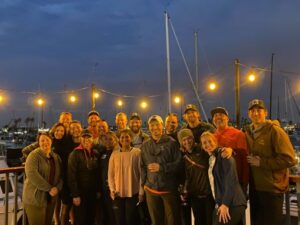
Executive MBA Cohort 78
New Executive MBA course takes students deeper into ESG
Students in each MBA program at the Daniels College of Business have always considered the triple bottom line: people, planet and profit. Yet, in 2021 the College refreshed its Executive MBA curriculum and decided a deeper dive into two of the Ps was needed.
“The fourth industrial revolution is really what’s relevant in the technology space that affects the strategies of managers and executives,” said Andy Cohen, faculty director of the Executive MBA program. “And, the people and planet issues are what’s happening in our communities and with our people.”
Cohen, along with other faculty members including Charles Dhanaraj, developed a new required course called Stakeholders Beyond the Shareholders. The course focuses on environmental, social and governance (ESG) factors that affect companies.
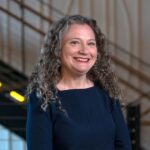
Jennifer Leitsch
“Sustainability and ESG are concepts that all business professionals should understand and understand how they apply to their organization,” said Jennifer Leitsch, managing director for Climate Change and Sustainability Services at Ernst & Young (EY). Leitsch was one of three faculty members for the course. Leitsch worked in sustainability in-house for Prologis and CBRE, before moving over to EY to lead its climate change and sustainability offerings to real estate, hospitality and construction clients.
EMBA student Sue Keeley called the environmental portion of the Stakeholders Beyond the Shareholders course eye-opening.
“I loved this class,” said Keeley, who is a sales director for Phillips Healthcare. “It really sparked my interest in ESG and forced me to do a lot of digging around in my own organization, as well as some soul searching.”
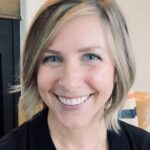
Sue Keeley
Keeley is considering a career change within her organization. She’d like to look at sustainability within the operations units, including evaluating the supply chain ecosystem. The class also helped her and her husband with their fly fishing business, Anglers All.
“The very success and viability and sustainability of our business relies on the health of our planet, so it’s always been very relevant in our fly fishing world,” she said.
While the E in ESG is a half of the course, there is also a big focus on the S, which is social, meaning the people. In today’s world that means a heavy focus on diversity, equity and inclusion. Kelly Brough and Jana Henthorn have team taught that section of the course.
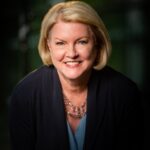
Jana Henthorn
Henthorn spent 31 years in the cable industry, often as one of the only women in senior leadership in her company. Brough was the CEO of the Denver Metro Chamber of Commerce, and is now running for mayor of Denver.
“I think business leaders are key to changing the inequities we see, and to change them you have to first to understand how to find them,” Brough said. “We tend to think of inequities as something other professions focus on, like social work. Yet, as business leaders, it has to be central to our work as well.”
EMBA student Elie Maksoud couldn’t agree more. He is a neuroscientist and the business development lead at the Science Communication Lab.
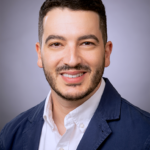
Elie Maksoud
“Our goal is to make high-quality science education available to everyone, everywhere for free,” Maksoud said. “DEI is embedded in all our products.”
Maksoud, a queer, Lebanese-French man, admired the humility and openness of the professors.
“They set the tone for class,” he said. “We had two white female professors but they brought in speakers so we could learn from a variety of people. The professors made people feel comfortable enough to share their personal experiences without being offensive or hurtful to minority students.”
Henthorn shared that the students had intense discussions, yet in a safe space.
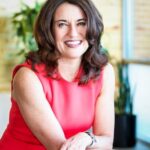
Kelly Brough
“I learned things talking to them and listening to their perspectives,” she said. “It was a reverse mentoring situation. They were very smart and thoughtful students.”
As Brough notes, the ESG space isn’t a course where you’ll ever fully “know” the topic.
“We really emphasize for our students this isn’t one of those courses, like accounting, where you now know it,” Brough said. “This is a course where you’re making a decision about how you can create an environment where you’re continually learning and understanding diversity, equity and inclusion issues in your organization, and advancing the work.”
